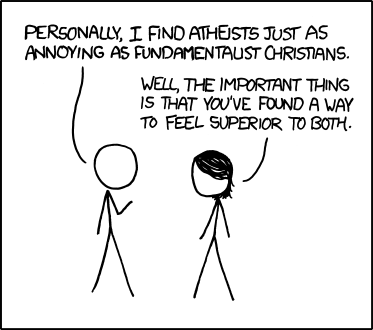Office Christmas party, Skeptics in the Pub, and ordinary December blahs have conspired to rob me of the energy necessary to turn the random thoughts/news items of the day into 1000 coherent words. While I recuperate, please enjoy this classic post, written at a time when 99% of you weren’t readers yet.
There is a very stupid argument out there in the world of arguments. It goes something like this:
You have to believe in science, just like you have to believe in religion. Therefore, science is just another kind of religion.
On the surface, that appears to be a logical premise. It even managed to find its way into an episode of one of my favourite shows. However, that’s due to an unfortunate accident in the English language whereby “believe” has two meanings. I’m not going to go through the entire argument here, except to give a specific example. The statement “I believe in myself” means that you have confidence that you will be able to perform a task based on self-knowledge. It does not (or at least not usually) mean “I have faith that I exist as an entity” although Descartes would probably have a few things to say about that. At any rate, the word “believe” when it comes to reliance on facts and observation is quite distinct from “believe” when it comes to large, unfathomable concepts. I’ll let PZ Myers and xkcd talk about that for now, and perhaps come back to it later.
However, it doesn’t matter. Let’s, for the sake of argument, allow this line of reasoning. Let’s suspend logic in this particular case and grant that you have to believe in science in the same way you have to believe in religion (or God, or faeries, or gremlins, or whatever you believe in). Even if we make this concession, science is still far better than religion for one very important reason: [Read more…]


